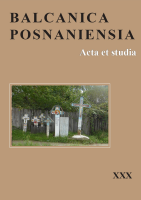BALKAN ORTHODOX CHURCHES IN SOVIET UNION POLICY (IN THE FIRST YEARS AFTER THE SECOND WORLD WAR)
BALKAN ORTHODOX CHURCHES IN SOVIET UNION POLICY (IN THE FIRST YEARS AFTER THE SECOND WORLD WAR)
Author(s): Tadeusz CzekalskiSubject(s): Cultural history, History of Church(es), Social history, WW II and following years (1940 - 1949), Eastern Orthodoxy, Sociology of Religion
Published by: Uniwersytet Adama Mickiewicza
Keywords: Balkan history; Soviet Union; communism; Orthodox Church; religious policy;
Summary/Abstract: The aim of the article is to present the concept and actions taken by the Soviet diplomacy and the hierarchy of the Russian Orthodox Church to subjugate the Orthodox communities in the communist Balkan countries. The mechanism of the subjugation of the Balkan churches has been included into a comparative perspective and integrated into the broader concept of the Moscow Patriarchate towards gaining a leading role in the Orthodox world in the first years after the end of the Second World War. The process of dependency and its effects are reflected in diplomatic documents, but also in those produced by the Orthodox Churches themselves. The key element for gaining central position in the Orthodox world by Moscow was the organisation of anniversary celebrations and conferences to integrate the community and to involve it in the implementation of plans towards Soviet political domination. The results of these efforts were very limited in relation to ambitions outlined by the leadership of the Soviet state, revealing differing positions of the major patriarchates, as well as a real strength of authority and prestige that the Ecumenical Patriarchate invariably enjoyed.
Journal: Balcanica Posnaniensia Acta et studia
- Issue Year: 2023
- Issue No: 30
- Page Range: 207-224
- Page Count: 18
- Language: English

